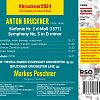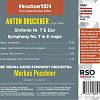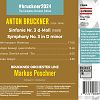releases
BRUCKNER Complete Versions Edition

#bruckner24 Symphony #9
+ Bonus: Symphony in F minor 'Study Symphony' (1863)
Bruckner Orchester Linz · Markus Poschner
2CD-Set C8096 PC: 21 UPC: 845221080963
This final release of Capriccios Bruckner Symphonies - The Complete Versions Edition includes his very first and last Symphony. In March 1861, Anton Bruckner completed his counterpoint studies with the renowned teacher Simon Sechter who had also taught Schubert. His graduation signaled the end of an extended compositional hiatus. Bruckner’s F-Minor Symphony was conceived in the classical and early romantic tradition of Beethoven, Schubert, Mendelssohn and Schumann.
Bruckner’s Ninth: his best (as some say) symphony, certainly his most daring and, thanks to the missing finale, his most mysterious. It is where Bruckner meets Mahler and, while working on it, his maker. He wanted to write a finale, of course, but too much remains missing. What is left, is a heavenly Adagio, which quietly fades away with references in the brass to the two preceding symphonies. Thus ends Bruckner’s uncompleted life’s work.
Weitere Bilder

#bruckner24 Symphony #3 (1877) + Adagio (1876)
(The Complete Versions Edition)
ORF VIENNA RADIO SYMPHONY ORCHESTRA BRUCKNER ORCHESTER LINZ · MARKUS POSCHNER
C8095 PC: 21 UPC: 845221080956
Anton Bruckner began the revision of his Third Symphony after completing the Fifth on 16 May 1876 and continued working on it sporadically until 28 April 1877. Then, after the Vienna Philharmonic rejected the Symphony for a third time, Bruckner’s friend, Hofkapellmeister Johann Herbeck, took matters into his own hands. He arranged to conduct the work himself on the concert series of the Society for the Friends of Music [Gesellschaftskonzerte] on 16 December 1877. After Herbeck passed away unexpectedly, Bruckner was forced to conduct the symphony himself. The performance proved to be one of the worst debacles of his career. The players were rude and unreceptive, and the audience left the concert hall in droves. Despite the public fiasco, Theodor Rättig, one of the few people who stayed, offered to publish the symphony. Two other people who were there at the end, Gustav Mahler and Rudolf Krzyzanowski, prepared a piano four-hand reduction for Rättig’s publication which appeared at the end of 1879. It was the first publication of a Bruckner Symphony.
Weitere Bilder

#bruckner24 Symphony #1 (1891)
(The Complete Versions Edition)
BRUCKNER ORCHESTER LINZ · MARKUS POSCHNER
C8094 PC: 21 UPC: 845221080949
Anton Bruckner finally received the award of an honorary doctorate of the University of Vienna on 11 December 1891. For Bruckner, receiving the doctorate fulfilled a long-time wish. He had spent most of his life pursuing academic credentials and applied for honorary doctorates at Cambridge University in 1882 and at the Universities of Pennsylvania and Cincinnati in 1885. Two days later, Hans Richter conducted the Vienna Philharmonic in the first performance of the second or so-called “Vienna” version of the composer’s First Symphony which he had dedicated to the university in gratitude for the degree. The changes Bruckner made in the revised version of the First Symphony are not as extensive as those he made to the Third, Fourth and Eighth Symphonies during the late 1880s and early 1890s. His revisions to the First Symphony did not affect the overall form of any of the movements. He changed many details of orchestration, articulation, and phrase length, some of which are difficult to notice on first hearing. The 1891 autograph score is, nevertheless, the composer’s final word on how he wanted his First Symphony to be performed and understood.
Weitere Bilder

#bruckner24 Symphony #7
(The Complete Versions Edition)
ORF VIENNA RADIO SYMPHONY ORCHESTRA · Markus Poschner
C8091 PC: 21 UPC: 845221080918
“Since Beethoven, nothing has been written that even comes close!”
The great conductor Arthur Nikisch made this remark to Bruckner’s former student, Joseph Schalk and also his fellow conductor, Hermann Levi, described the piece as “the most significant symphonic work since Beethoven’s death.” Arthur Nikisch conducted the first performance in the Stadttheater, Leipzig, on 30 December 1884, with Bruckner in the audience. While the performance was not a total triumph, it brought the sixty-year-old composer significant international recognition for the first time. During the composer’s lifetime, the Seventh, especially its Adagio, was his most popular symphony, and it remains among his most beloved and frequently performed works.
Weitere Bilder

#bruckner24 Symphony #3 (1889)
(The Complete Versions Edition)
BRUCKNER ORCHESTER LINZ · MARKUS POSCHNER
C8088 PC: 21 UPC: 845221080888
Bruckner’s Third Symphony had always been something of a problem child among Bruckner’s symphonies, from its disastrous first reception (an enthused youthful Gustav Mahler notwithstanding) until well into the 20th century. In its original form, it is the longest, most Wagnerian of his symphonies – and often considered, rightly or not, the first truly Brucknerian symphony. While some cherish the uncompromising originality of the first version, Bruckner himself wanted the third, much tightened Edition performed, finding it “incomparably better”. It is that final version that is here recorded – and listeners can now easily decide for themselves.
Weitere Bilder

#bruckner24 Symphony #2 (1872)
(The Complete Versions Edition)
ORF VIENNA RADIO SYMPHONY ORCHESTRA · Markus Poschner
C8093 PC: 21 845221080932
Bruckner’s Second Symphony is a rare enough encounter in its 1877 version, but it’s virtually unperformed in the 1872 original version. This is not owing to some deficiency of the earlier ideas compared to the later alterations. It’s mainly habit and convenience because to get new parts and re-learn something ostensibly known, that differs in a great many details, means an extra expense of effort and resources. That’s a shame, really, because it is decidedly worth discovering the original, not-yet-ironed-out rawness of Bruckner’s early masterpiece, which was something unheard of at the time – but needn’t remain unheard now.
Weitere Bilder

#bruckner24 Symphony #1 (1868) 'Linz'
(Complete Versions Edition)
BRUCKNER ORCHESTER LINZ · Markus Poschner
C8092 PC: 21 UPC: 845221080925
By his own reckoning, Bruckner began his career as a professional composer when he was thirty-nine years old. With a mere exercise for a symphony under his belt – the unnumbered one in F minor – he was now ready to write his first true symphony. The world was not. First performed in 1868 in Linz – badly – the work flopped and was put aside until nine years and five symphonies later, when it was gently adjusted. A subsequent performance in 1884 was Bruckner’s “most successful Viennese performance to date”, prompting, perplexingly, a thorough revision that would be the 1891 “Vienna” version. This recording uses the unadulterated 1868 “Linz” version.
Weitere Bilder

#bruckner24 Symphony #5
(Complete Versions Edition)
ORF VIENNA RADIO SYMPHONY ORCHESTRA · MARKUS POSCHNER
C8090 PC: 21 UPC: 845221080901
Among Bruckner’s Symphonies, the Fifth is his contrapuntal masterpiece; the grandest until the Eighth. The tour-de-force of a finale gives us an idea of what the finale of the Ninth might have been like. Its magnificent dark and halting opening with the descending bass line – so effectively recalled in the finale – is inimitable. Although long available only in a disfigured version by Franz Schalk, it is also distinct for never having been the subject to revision or, perhaps, even doubt on the part of Bruckner – who never heard it performed with an orchestra. And yet, when Bruckner wrote this masterpiece, he was still far from establishing himself as a composer in Vienna and his spirits were as low as ever, writing a friend that “my life has lost all joy and delight – in vain and for nothing.” A radiant pinnacle from amid darkness.
Weitere Bilder

#bruckner24 Symphony #2 (1877)
(Complete Versions Edition)
BRUCKNER ORCHESTER LINZ · Markus Poschner
C8089 PC: 21 UPC: 845221080895
This Complete Versions Edition includes all versions published or to be published under the auspices of the Austrian National Library and the International Bruckner Society in the Neue Anton Bruckner Gesamtausgabe (The New Anton Bruckner Complete Edition)
"What nonsense”, grumbled Otto Dessoff after a read-through (to determine its repertoire-worthiness for the Vienna Philharmonic) of Bruckner’s Second Symphony. This doomed the work to a life of revision. The first version was written in 1871 when the Second was still the Third Symphony because the Zeroëth, then still the Second, hadn’t been annulled yet. Despite Bruckner managing a well-enough regarded premiere of this version, he set about to rework it during his period of revision in 1877 where he and his eager helpers set about to radically trim any perceived fat. The result, which we know as the second version, changed most in the Finale, where a full 193 bars were pruned. This version follows Bruckner’s cuts unflinchingly which cannot, however, alter the Symphony’s expansive proto-Brucknerian structure first heard here. And then that marvelous Adagio in this lyrical sister of the First Symphony!
Weitere Bilder

#bruckner24 Symphony #4 (1888) 'Romantic'
Symphony No. 4 in E flat major (1888) 'Romantic'
ORF VIENNA RADIO SYMPHONY ORCHESTRA · MARKUS POSCHNER
C8085 PC: 21 UPC: 845221080857
Bruckner’s frantic revisions of his symphonies Nos. 3, 4, and 8 were borne out of his disappointment with Hermann Levi rejecting the original version of the 8th symphony. Helping in this large-scale revamping effort were former Bruckner-students Franz and Joseph Schalk, Ferdinand Löwe, Max von Oberleithner, and Cyrill Hynai, which resulted in these versions’ reputation – and especially that of the last version of the 4th – being varnished as something not quite Echt-Bruckner. It wasn’t until the discovery of photographs of the 1888 version’s manuscript score and the subsequent publication of Benjamin Korstvedt’s edition thereof that it became clear: This late edition really did reflect Bruckner’s intentions. To ears familiar with the still better-known 1881 version, the result might sound mystifying, even troubling, but it also surprises with many particularly exquisite passages!
Weitere Bilder

#bruckner24 Symphony #8 (1887)
(Complete Versions Edition)
BRUCKNER ORCHESTER LINZ · MARKUS POSCHNER
C8087 PC: 21 UPC: 845221080871
This Complete Versions Edition includes all versions published or to be published under the auspices of the Austrian National Library and the International Bruckner Society in the Neue Anton Bruckner Gesamtausgabe (The New Anton Bruckner Complete Edition).
Was it a sign of conductors’ general satisfaction with Bruckner’s Eighth Symphony or editorial foot-dragging, that the work’s original 1887 version wasn’t published and performed until 1972? It certainly was Hermann Levi’s dissatisfaction or at least discombobulation with it, so shortly after his very successful Munich performance of the Seventh, that made Bruckner revise the work in the first place. It is this elaborate, raw earlier version that Markus Poschner performs here, in the latest edition by Paul Hawkshaw for the New Anton Bruckner Complete Edition. More ornate, brassier, and with more economically employed woodwinds, this version doesn’t smoothen edges and doesn’t round corners: An interesting insight into emboldened Bruckner at his unadulterated self.
Weitere Bilder

#bruckner24 Symphony #4 (1876) 'Romantic'
(Complete Versions Edition)
ORF VIENNA RADIO SYMPHONY ORCHESTRA · MARKUS POSCHNER
C8084 PC: 21 UPC: 845221080840
This Complete Versions Edition includes all versions published or to be published under the auspices of the Austrian National Library and the International Bruckner Society in the Neue Anton Bruckner Gesamtausgabe (The New Anton Bruckner Complete Edition)
Continuing their survey of all of Anton Bruckner’s symphonies in each and every one of their various versions, Markus Poschner and his team now tackle the original 1876 version of Bruckner’s arguably most popular symphony, the Fourth. “1876? Surely you mean 1874!” might the Bruckner-maven go. Well, actually, recent research has brought to light that Bruckner was still fiddling around with his first go at that work, but not so substantially that the changes amounted to a separate version or, for that matter, the 1878 second “standard” version. Paul Hawkshaw’s liner notes detail all the differences if you’re interested – but of course, one can also just enjoy the raw and fresh music of Bruckner’s expansive first ideas.
Weitere Bilder

#bruckner24 Symphony #3 (1873)
(Complete Versions Edition)
ORF VIENNA RADIO SYMPHONY ORCHESTRA · MARKUS POSCHNER
C8086 PC: 21 UPC: 845221080864
This Complete Versions Edition includes all versions published or to be published under the auspices of the Austrian National Library and the International Bruckner Society in the Neue Anton Bruckner Gesamtausgabe (The New Anton Bruckner Complete Edition)
Bruckner revised his Third Symphony more than any other: There are three manuscript versions, two published versions from within his lifetime, a separate manuscript of the Adagio, and surviving revision fragments from 1874, 1875, and 1876. In its first version (here recorded), it is Bruckner’s longest and most overtly Wagnerian symphony. When Brucknerian extraordinaire Robert Simpson got to study Nowak’s edition of this version in 1977, he threw his hitherto held opinions overboard and declared it an “achievement… progressively maimed in successive versions.” As part of this completist cycle, Markus Poschner will present the work in all states of pruning, but this is the obvious point to start at.
Weitere Bilder

#bruckner24 Symphony #4 (1878-1880) 'Romantic'
'Country Fair' Finale (1878) · (Complete Versions Edition)
BRUCKNER ORCHESTER LINZ · ORF VIENNA RADIO SYMPHONY ORCHESTRA · Markus Poschner
C8083 PC: 21 UPC: 845221080833
This Complete Versions Edition includes all versions published or to be published under the auspices of the Austrian National Library and the International Bruckner Society in the Neue Anton Bruckner Gesamtausgabe (The New Anton Bruckner Complete Edition)
“I am completely convinced that my Fourth Romantic Symphony is in pressing need of a thorough revision.” (Anton Bruckner, 1877). Since its successful first performance by the Vienna Philharmonic under Hans Richter on February 20th, 1881, the Fourth Symphony has been one of Anton Bruckner’s most beloved works. The success of the Fourth did not come easily to the composer as he revised the entire symphony twice and its finale three times. The present recording features the second and most often performed version in a new edition by Benjamin Korstvedt, published as part of the New Anton Bruckner Collected Works Edition. It also includes Korstvedt’s edition of the “Country Fair” (Volksfest) Finale that Bruckner composed in 1878 and replaced in 1880.
Weitere Bilder

#bruckner24 Symphony in D minor (Nullte / Nullified)
(Complete Versions Edition)
BRUCKNER ORCHESTER LINZ Markus Poschner
C8082 PC: 21 UPC: 845221080826
The most comprehensive Bruckner Symphonies cycle, including all 19 available versions.
This third release of Capriccios Bruckner Edition, of Symphony in D minor ("Nullified") is performed by Bruckner Orchestra Linz conducted by Markus Poschner.
Although the work did not belong to the corpus of nine numbered symphonies which the composer had identified in his will as worthy of preservation in the imperial library, and for which he is best remembered, he did not destroy it. Hoping perhaps, to ensure that future generations would assess the symphony in what he considered its proper perspective, he wrote annotations at various places in the manuscript: “invalid” [ungiltig] “completely void” [ganz nichtig] and “annulled” [annulirt]. This new complete Bruckner Symphonies edition from Capriccio reassesses these enduringly enigmatic and complex works. Presented by the Bruckner Orchestra Linz and the ORF Vienna Radio Symphony Orchestra, and featuring all 19 available versions, the cycle is scheduled for completion in 2024, Bruckner’s 200th birthday.
Weitere Bilder

#bruckner24 Symphony #8 (1890)
(Complete Versions Edition)
Bruckner Orchester Linz - Markus Poschner
C8081 PC: 21 UPC: 845221080819
This Complete Versions Edition includes all versions published or to be published under the auspices of the
Austrian National Library in the Neue Anton Bruckner Gesamtausgabe
(New Anton Bruckner Collected Works Edition).
Anton Bruckner burst out of the confines of the cathedral using that most secular of musical forms, the symphony. The creator of some of the 19th century’s greatest orchestral music, Bruckner cut a singular figure among his contemporaries. This new complete Bruckner Symphonies edition from Capriccio reassesses these enduringly enigmatic and complex works. Presented by the Bruckner Orchestra Linz and the ORF Vienna Radio Symphony Orchestra, and featuring all 19 available versions, the cycle is scheduled for completion in 2024, Bruckner’s 200th birthday. The second release, of Symphony No. 8 (1890 version) is performed by Bruckner Orchestra Linz conducted by Markus Poschner.
Weitere Bilder

#bruckner24 Symphony #6
(Complete Versions Edition)
Symphony No. 6 Bruckner Orchester Linz · Markus Poschner
C8080 PC: 21 UPC: 845221080802
Start of the most comprehensive Bruckner Symphonies Edition incl. all available 19 versions.
Bruckner burst out of the confines of the cathedral using that most secular of musical forms: the symphony. It is with reflexive reoccurrence in music history that supposed performance traditions burn themselves into a score as if they were a given… and the more so, the further we get from the work’s creation. So many clichés and truths about his person and his work are at last being questioned or, if they aren’t yet, are overdue some scrutiny. It is an essential aspect of this CD Edition to read and understand the text fresh and anew. Whence does Bruckner’s music come and whereunto does it point? With the Bruckner Orchestra Linz and the ORF Vienna Radio Symphony Orchestra Capriccio could engage two of the best Austrian orchestras for this in total 19 versions counting cycle. With about 1065 minutes of music this complete symphonic edition will be finished in 2024, when we will celebrate Bruckner’s 200th Birthday.




































